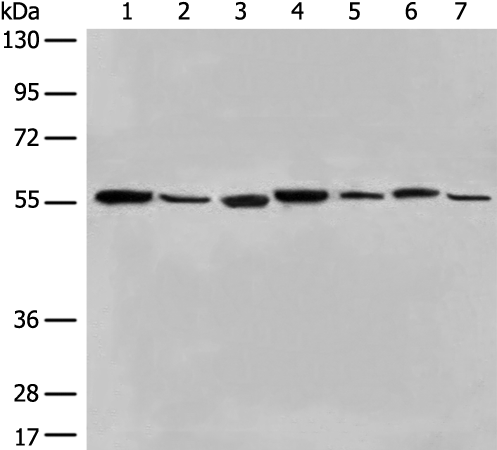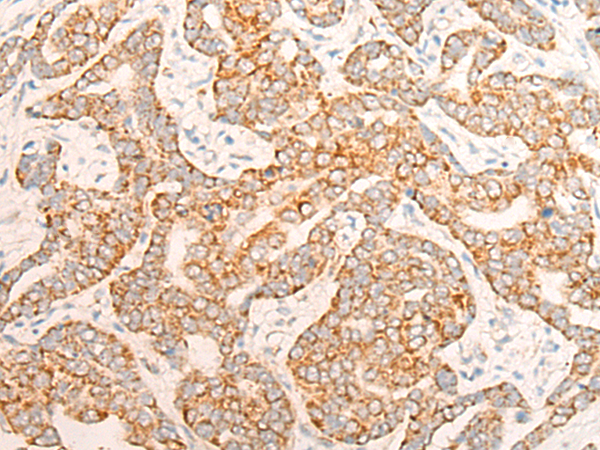

| WB | 咨询技术 | Human,Mouse,Rat |
| IF | 咨询技术 | Human,Mouse,Rat |
| IHC | 1/20-1/100 | Human,Mouse,Rat |
| ICC | 技术咨询 | Human,Mouse,Rat |
| FCM | 咨询技术 | Human,Mouse,Rat |
| Elisa | 1/5000-1/10000 | Human,Mouse,Rat |
| Aliases | EPD; PDE; ATQ1 |
| WB Predicted band size | 59 kDa |
| Host/Isotype | Rabbit IgG |
| Antibody Type | Primary antibody |
| Storage | Store at 4°C short term. Aliquot and store at -20°C long term. Avoid freeze/thaw cycles. |
| Species Reactivity | Human, Mouse, Rat |
| Immunogen | Synthetic peptide of human ALDH7A1 |
| Formulation | Purified antibody in PBS with 0.05% sodium azide and 50% glycerol. |
+ +
以下是3篇与ALDH7A1抗体相关的文献摘要信息,供参考:
1. **文献名称**:Mutations in ALDH7A1 cause pyridoxine-dependent epilepsy
**作者**:Mills PB, et al.
**摘要**:该研究首次发现ALDH7A1基因突变导致吡哆醇依赖性癫痫,利用ALDH7A1抗体进行Western blot验证患者细胞中蛋白质表达缺失,揭示其作为α-氨基己二酸半醛脱氢酶的代谢功能异常与疾病关联。
2. **文献名称**:ALDH7A1 expression in human cancers: Prognostic and therapeutic implications
**作者**:Chen Y, et al.
**摘要**:通过免疫组化分析ALDH7A1抗体标记的肿瘤组织,发现其在乳腺癌、结肠癌中高表达,并与患者生存率负相关,提示其作为癌症预后标志物及潜在治疗靶点的价值。
3. **文献名称**:Immunolocalization of ALDH7A1 in zebrafish brain development
**作者**:Zhang L, et al.
**摘要**:研究采用ALDH7A1特异性抗体进行斑马鱼脑组织免疫荧光染色,揭示该蛋白在神经前体细胞中的动态表达模式,提示其在神经系统发育中的调控作用。
注:实际文献检索建议通过PubMed或Google Scholar输入"ALDH7A1 antibody"结合研究领域关键词(如epilepsy, cancer等)获取最新文献。部分研究可能侧重抗体应用技术(如IHC/WB优化),需根据实验需求筛选。
The ALDH7A1 antibody is a tool used to detect and study the ALDH7A1 protein, a member of the aldehyde dehydrogenase (ALDH) superfamily. ALDH7A1. also known as antiquitin, plays a critical role in lysine metabolism by catalyzing the oxidation of α-aminoadipic semialdehyde (α-AASA) to α-aminoadipic acid. This enzymatic step is vital for maintaining cellular homeostasis, particularly in the brain, where disruptions are linked to pyridoxine-dependent epilepsy (PDE), a rare autosomal recessive disorder caused by ALDH7A1 gene mutations.
Antibodies targeting ALDH7A1 are widely utilized in research to investigate protein expression, localization, and function in tissues or cell lines. They enable techniques like Western blotting, immunohistochemistry (IHC), and immunofluorescence (IF) to assess ALDH7A1 levels in disease models, aiding in the understanding of PDE pathophysiology. Additionally, these antibodies support diagnostic applications, such as confirming ALDH7A1 deficiency in suspected PDE cases.
Commercial ALDH7A1 antibodies are typically raised in rabbits or mice using immunogenic peptide sequences. Validation includes testing for specificity, sensitivity, and cross-reactivity. Beyond neurological disorders, ALDH7A1 is studied in cancer and metabolic syndromes due to its role in oxidative stress and detoxification. However, variability in antibody performance across experimental conditions necessitates careful optimization to ensure reliable results. Overall, ALDH7A1 antibodies are essential for advancing research into metabolic diseases and therapeutic development.
×